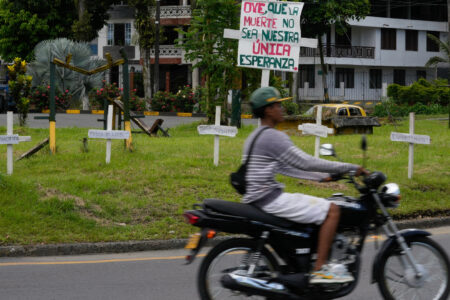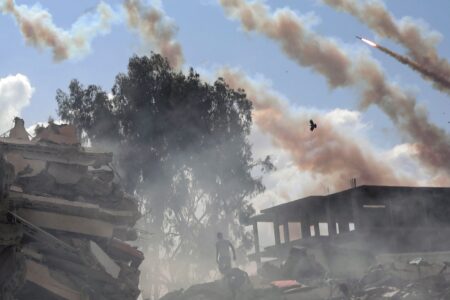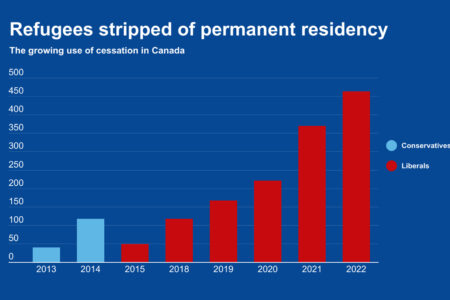
On the first day their parents walked Abdullah, Mohamad and Zaid Alsebaee to their new public school, the eight-year-old twins and their five-year-old brother panicked. Screaming and crying, they clung to their parents.
“Don’t leave us,” they begged. Unlike the first-day jitters of any new kindergarten student, the boys’ terror was absolute – fuelled by the losses they’d already endured.
It was just six weeks since the Alsebaee family had landed in Ottawa on December 21, 2015. They were among the first of about 1,500 Syrian refugees to arrive in the capital – 1,200 of them sponsored by the government, 200 privately sponsored by Canadian families or organizations, and about 100 “blended” refugees, chosen by private sponsors from a federal government list.
Almost immediately, Jehad and Nirmeen Alsebaee asked about school for their children. Jehad, 42, a shoe salesman in Hama, Syria, before the war, had completed only Grade 9. Nirmeen, 27, left high school to marry Jehad. They want their children to go further.
Apart from a few months in Lebanon, the Alsebaee children had never been in school. They are among about a third of the Syrian children arriving in Ottawa who have limited or interrupted schooling. The war intervened before the twins could start, and Zaid and their little sister, three-year-old Layana, were too young. The children had never been parted from their mother.
So when their parents dropped them off at Robert E. Wilson Public School that first day in February, the boys thought they were leaving them there and never coming back. “They were crying, and resisting going to school,” Jehad says, speaking through an interpreter.
The Alsebaee boys’ experience is a stark reminder of the stresses of resettlement that the Syrian newcomers face, both parents and children. Volunteers and front-line supporters, from teachers to nurses and doctors, psychologists and settlement workers, are helping many families like the Alsebaees to overcome the hurdles.
The Alsebaees have been able to rely on members of their Canadian refugee sponsorship group for support as they embark on their life in Canada. From reassuring them that their children’s distress at leaving them to start school would fade, to sewing home-made curtains for their apartment, their sponsors have driven them to the dentist’s office and to doctor’s appointments, taken them shopping, shared coffee and confidences, and driven Nirmeen to the hospital in the middle of the night when she needed emergency treatment.
Three members of their sponsorship group had even met the family at the school that first day to help them enroll the children.
But a wide gap is emerging between the help built into the system for privately sponsored and “blended” refugees, and the independence demanded of government-sponsored newcomers, many of whom are finding it a far lonelier journey.
A wide gap is emerging between the help built into the system for privately sponsored and “blended” refugees, and the independence demanded of government-sponsored newcomers.
“Privately sponsored refugees have natural supports,” says Paul Soublier, a settlement worker with the Catholic Centre for Immigrants, the city’s oldest settlement organization. “Government sponsored refugees don’t.”
Soublier has seen his caseload double from about 130 to 260 people since the Syrian refugees began to arrive in Ottawa. Just triaging his email and cell phone messages is a full-time job. “I cannot even tell when my phone is vibrating anymore. It’s like my leg is on permanent vibration,” he says.
As caring as Soublier is, and as many 12-hour days he and the centre’s seven other full-time and one part-time settlement worker put in, they simply can’t provide the level of personal support the refugees need. He has no doubt about which system works best for the new arrivals.
Jehan and Nirmeen Alsebaee explained their children’s fears with the help of Arabic-speaking staff at the Robert E. Wilson school. The principal and teachers responded with both compassion and creativity.
At first, they had the boys come for only half of each day. Although they had originally separated the twins so Abdullah, who was having the hardest time, didn’t upset Mohamad, they later reversed the decision and put them together in the same class.
Then the twins’ teacher brought a large clock to the front of the room. She explained to the boys that when the large and the small hand both hit 12, their father would come for them. For the first few days, as the noon-hour neared, the boys sat tensely at the front of the classroom, their eyes fixed on the hands of the clock. When their father arrived, their relief was palpable.
Today, the boys are staying in school for the entire day. Their anxiety about their parents’ whereabouts has lessened. If Jehad or Nirmeen arrive even five minutes’ early to pick them up, the boys protest, especially Abdullah. “He wants to stay with his friends,” says Nirmeen.
Just 13 kilometres away from the Alsebaees’ new apartment in south Ottawa, another family from Syria is dealing with their anxieties largely on their own.
Suliman, 43, is afraid to sleep without the medication a specialist has recently prescribed. He keeps replaying in his mind the images of people being decapitated in front of him. For four months in 2012, he was detained and tortured by members of Bashar al-Assad’s secret police. (Policy Options has agreed not to publish Suliman and his wife Amineh’s last names, in case of reprisals against families members who are still in Syria.)
“I am looking for a job, but I have a nervous condition, so I can only work part-time,” he explains, through an interpreter, who has volunteered to help.
Suliman, a car salesman before the war, was arrested in Damascus – a case of mistaken identity, he says. After he was released he spent the first two weeks in bed, “barely there,” he says. Then he, Amineh and their three children fled back to Daraa, a city in southern Syria where they had family.
A month later, at night, they walked via back roads across the border into Jordan. For 10 hours, they carried Suliman’s elderly mother, who was too ill to walk.
For three years and three months, they lived in a refugee camp. They had no running water or electricity, and few services. “No words can explain what we have gone through,” says Suliman.
When the opportunity arose for them to come to Canada as government-sponsored refugees, they took it – even though it meant leaving Suliman’s mother behind. Unable to endure conditions in the refugee camp, she had gone back to her home in Daraa to be with other family members.
Now Suliman, Amineh and the children live in a townhouse complex with many other Arab families. They are attending English classes regularly. Their children, too, are settling into school. But unlike the Alsebaees, Suliman and Amineh have no network of support to drive them to and from appointments, to invite them over for dinner, or to show up for a visit at Easter with chocolate and kites for the children, as the Alsaebaees’ sponsors did.
Suliman and Amineh have no network of support to drive them to and from appointments, to invite them over for dinner, or to show up for a visit.
Back in Syria, the family’s parents and siblings lived within walking distance. Their social life revolved around their extended family and friends. “We miss our family so much. This is all we’re thinking of, especially my mother,” says Suliman. He worries about who is taking care of her. He and the children used to help her up, take her to the bathroom, and bring her food.
“Over here, we feel lonely,” Amineh adds.
Financially, too, the family of five is struggling. They receive $1,500 a month from the federal government in sponsorship benefits. The townhouse costs $1,100 a month, plus utilities. They have just started to receive the federal child tax benefit, another $1300 or so per month, which will help. But when bills arrive expectedly, like several months’ worth of Enbridge gas payments at once, they have no one to turn to for help.
By contrast, the Alsebaees receive support from both the federal government and the Ottawa South Committee for Refugee Sponsorship, because they are in the ‘blended” refugee category. In addition to the child tax benefits they get, the federal government provides $1,400 a month, for six months, for the family of six.
The sponsorship group was supposed to match that amount for the remaining six months’ of the sponsorship agreement. But when Ottawa South group decided that the federal funds were insufficient, they topped them up.
“We originally budgeted $2,800 a month and have now increased that to $3,000 a month. We top up the six-month federal contributions to reach that monthly level,” says Robert Taylor, chair of the Ottawa South group. “It is a dire situation for refugees depending solely on government support, without a group,” he adds.
Government-sponsored refugee families like Suliman and Amineh’s are the newcomers Dr. Doug Gruner is most concerned about, because he knows that social support is a major factor in ensuring their eventual adaptation to Canadian society and improving their mental health.
Gruner treats the Syrian refugees at the Bruyère Family Medicine Centre. He is also the doctor leading the health task force for Refugee 613, an ad hoc group consisting of representatives of volunteer and settlement organizations that is trying to co-ordinate efforts to help the refugees while minimizing duplication. Gruner also belongs to a private sponsorship group in Old Ottawa South. Members of his group have taken the family they sponsored to an Ottawa Senators’ hockey game, brought them tobogganing at the city’s Arboretum, and introduced them to the joys of maple syrup at a cabane à sucre.
“They are showing them what it is to be Canadian,” says Gruner. “It really is a completely different experience for the government-assisted refugees.”
Typically, the government-sponsored refugees Gruner and his colleagues treat are less educated and poorer than the privately sponsored refugees are, he says. And they do not have the “unbelievable amount of resources” that privately sponsored refugees have available to help them navigate the health care system.
“It really is unfortunate that there hasn’t been a little bit better distribution of our resources,” Gruner says.
Before the refugees arrived in Canada, Gruner and his colleagues were concerned about mental health issues, given the trauma they have experienced. But they expected that most refugees would be in relatively good physical health, given the well-established health care system in Syria before the war.
In fact, the doctors and nurse practitioners at the Bruyere clinic are seeing refugees with “significant” physical needs, Gruner says. Some of his patients are recovering from bullet wounds and require rehabilitation.
Some Syrian refugees are arriving with significant health issues, including complications from bullet wounds and post-traumatic stress disorder.
Pediatric resources are also critical, since 60 percent of the Syrian refugees are children, Gruner says. He estimates that 4-6 percent of the Syrian children have cognitive or developmental delays, including Down Syndrome. Those pediatric issues require referrals and connections to community services – particularly challenging given that these are Arabic-speaking children and the community programs may not have Arabic-speaking staff.
“Thankfully, we have a very good relationship with our pediatric colleagues and the resources available in our community. They’re being taxed to the limit,” Gruner says.
Connecting the families of developmentally delayed children with those supports also involves overcoming cultural hurdles – on both sides of the divide. That’s a challenge Robyne Warren, coordinator of the K-12 Family Reception Centre at the Ottawa District School Board, is accustomed to meeting. The centre assesses all the arriving Syrian children (as it does all refugees and immigrants) before placing them in schools and classes appropriate for their educational needs.
Recently, Warren had difficulty persuading the family of one seven-year-old girl to keep an appointment at the centre for an assessment. She’d set an appointment time, and members of the family would show up without the little girl.
Finally, she described their explanation why.
“They said, ‘how can we bring her – she doesn’t walk or talk, and we don’t have any transportation,’” Warren recounts. “Here I am, in my Euro-centric world, saying ‘your appointment’s tomorrow at 9:45,’ not even imagining the difficulty.” In Syria, children with their daughter’s disability simply didn’t go to school. Without a wheelchair, the family carried her around and met her needs as best they could.
Once Warren realized the problem, she explained to the family that there are two schools in Ottawa with special facilities that their daughter could attend. She also arranged to travel to the family’s new home with an interpreter. She’ll do the assessment there.
People like Warren who are working with the Syrian refugees are adapting to the families’ needs and finding creative solutions to help access services. “We have to be creative in order to do the work without enough resources,” says Lucila Cabrera, coordinator of the Client Support Services Program at the Catholic Centre for Immigration.
But Gruner remains particularly concerned about getting refugees access to mental health services if they require them, as Suliman does.
Typically, symptoms of post-traumatic stress disorder, depression or anxiety may not surface until several months after the refugees have arrived. That’s when access to psychiatrists or psychologists (the latter are not covered by the Ontario Health Insurance Plan) becomes crucial.
“This has shone a light on the fact that we really don’t have an ideal situation when it comes to mental health, not just for refugees but for all newcomers and also Canadians, in general,” he says.
He’s also worried about the unsustainable caseload of the settlement workers, who, he says, are “burnt out.”
“If the government is going to take a lesson from this…it’s that if they are going to bring in 25,000 refugees in three months, they need to make sure that the settlement community is funded enough. They did up the funding to some degree, but not enough,” Gruner says.
“If the government is going to take any lessons from this…it’s that they need to make sure that the settlement community is funded enough.”
Meanwhile, he is grateful for the private sponsors who help, like Gillian Blackell and Bernard Olivier, two lawyers who work for the federal government and have joined forces with about 10 others in Gatineau, Quebec, to sponsor Nadja Al-Hassan, her husband Ali and their three children. Olivier raised $38,000 within two weeks of sending out an email to friends and families, enough to sponsor two families, he hopes. “It’s something I’ve wanted to do for a long time,” he says. Adds Blackell: “We have the ability now, and we have the means.”
Nadja and her family lived with the Blackell-Olivier family when they first arrived in Gatineau, until their apartment was ready. Since then, the sponsoring family has also met other Syrian refugees, including Tawasef Al-Hassan, who were sponsored by different groups but who have since become friends. By getting to know not only the family they sponsored but also other Syrian newcomers, Olivier and Blackell have created a large, supportive community that fosters friendships among several of the refugee families.
“I never saw anything like this before – the hospitality is amazing,” says Nadja Al-Hassan through an interpreter. Adds her friend Tawasef Al-Hassan, “We feel included – not like strangers. One day, when we are better, we will help others.”
Photo: Syrian Refugee Tawasef Al-Hassan, center, poses for a photo with members of the Northern Light Sponsorship Group, Gillian Blackell and Bernard Olivier, in Gatineau on Tuesday, April 21, 2016. Photo by Patrick Doyle
This article is part of the Refugee Integration special feature.
Do you have something to say about the article you just read? Be part of the Policy Options discussion, and send in your own submission. Here is a link on how to do it. | Souhaitez-vous réagir à cet article ? Joignez-vous aux débats d’Options politiques et soumettez-nous votre texte en suivant ces directives.







